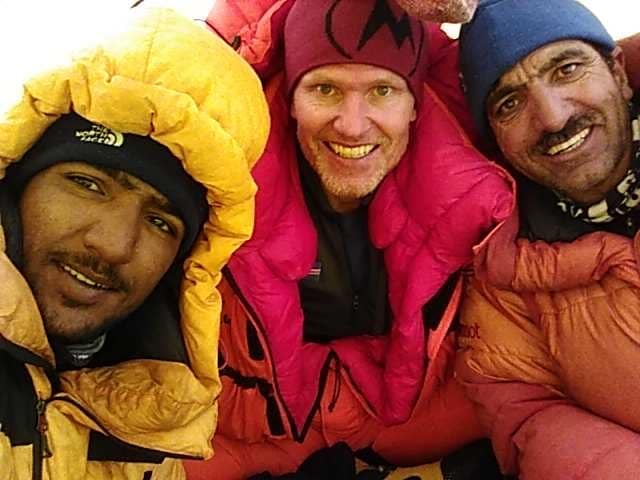Pakistan military helicopters scour mountain for three K2 climbers feared dead
Helicopters failed to spot the lost climbers on the third consecutive day as hope for their survival faded

Your support helps us to tell the story
From reproductive rights to climate change to Big Tech, The Independent is on the ground when the story is developing. Whether it's investigating the financials of Elon Musk's pro-Trump PAC or producing our latest documentary, 'The A Word', which shines a light on the American women fighting for reproductive rights, we know how important it is to parse out the facts from the messaging.
At such a critical moment in US history, we need reporters on the ground. Your donation allows us to keep sending journalists to speak to both sides of the story.
The Independent is trusted by Americans across the entire political spectrum. And unlike many other quality news outlets, we choose not to lock Americans out of our reporting and analysis with paywalls. We believe quality journalism should be available to everyone, paid for by those who can afford it.
Your support makes all the difference.The aerial search for three mountaineers who lost contact with base camp during the ascent of K2, the word’s second-highest mountain peak, was aborted shortly after it was resumed on the third day.
Pakistan army deployed its choppers on the mission to locate the three climbers, including one Pakistani national and other two from Iceland and Chile, on 6 February but halted their attempt to rescue the lost climbers on the third consecutive day on Monday due to bad visibility.
“Third day's search and rescue mission is over, Heli’s flayed 7000 M, now back to Skardu. Visibility over the mountain is poor the mountains is covered with clouds above 7000M,” a private mountaineering firm Alpine Club tweeted.
Celebrated Pakistani climber, Muhammad Ali Sadpara, 45, John Snorri, 47, of Iceland, and Juan Pablo Mohr, 33, of Chile, lost contact with the base camp late on Friday after 8,000 metres of ascent on K2.
K2, in the Karakoram range, is second highest after Everest and has a height of 8,611-metres (28,250ft). The peak, one of the most dangerous to climb, is referred to as the “killer mountain”.
The three men went missing at what is considered to be the most difficult part of the climb called the bottleneck – a steep and narrow alley just 300 metres shy of the 8,611 metre-high K2. The spot is just above the maximum altitude at which helicopters can fly.
Waqas Johar, a district government administrator, said on Friday that almost 60 per cent of K2 was under clouds and the missing will be resumed when the weather improves. He added that no clues of the climbers have been found yet.
Mr Sadpara, an experienced climber and his team, left for the mission from the base camp on 3 February along with his 20-year-old son Sajid Sadpara.
He was told by his father to descend from the bottleneck when an oxygen mask he was using malfunctioned.
“I kept the light of my tent on at night thinking they would see it when they return,” he said.
The son said in a video statement that the chances of their survival are none and they are just awaiting a miracle.
“I think if they search for the bodies it makes sense to continue the operation, but their chances of surviving, if you are at 8,000 (metres) in winter for two or three days, a person's chances of surviving are next to none.”
Mr Sadpara had earlier scaled the world’s tallest mountain peaks, including the eighth highest of Manalsu. This was his second attempt to climb K2 a month after his first attempt failed due to bad weather.
This comes after Bulgarian climber, Atanas Skatov's body was recovered from the mountain by helicopter on 5 February and officials believe he fell while trying to climb K2.
10 Nepali climbers became the first ones to summit K2 in the winter last month.
According to mountaineering experts, although Everest is 237 meters taller than K2, the world's second highest peak is much farther north, and hence the weather conditions are much worse during winters. Therefore, the summit is dangerous in winters.
Temperatures can drop to -60C in and winds at more than 125 mph on K2. In 2008, 11 climbers died on K2 over the course of two days in one of the deadliest mountaineering accidents.
Additional reporting by agencies



Join our commenting forum
Join thought-provoking conversations, follow other Independent readers and see their replies
Comments